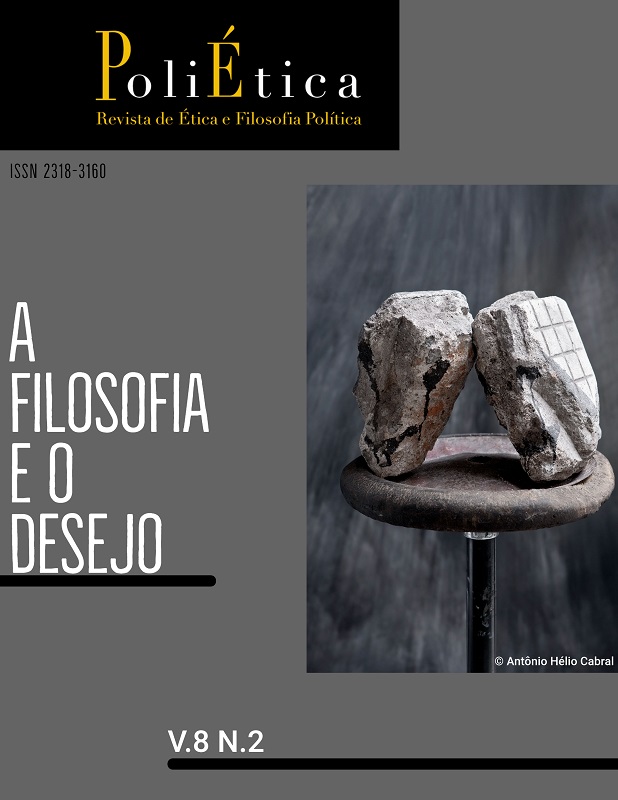The interpellation of the individual into a subject or the grammar of the subject: identities, desire, and racism in Judith Butler, Lélia Gonzalez and Grada Kilomba
DOI:
https://doi.org/10.23925/poliética.v8i2.52129Keywords:
Interpellation, Identity, Desire, RacismAbstract
This essay aims to reflect the individual’s interpellation in subject (identities or identifications). This process materializes structurally through intelligibility in exclusive and hierarchical dichotomous pairs. In this way, initially, the focus was on a reinterpretation of Althusser’s theory of interpellation by Judith Butler. After approaching the constitution of identity processes in a broad way, assuming the post-structuralist perspective in which there is a deconstruction of the ontology of identities as essential and natural, attention was focused on the relationship between desire and racism present in the thinking of black feminist authors. Along this path, the answer was how the desire and racism intertwine in the construction of black female subjectivity. Lélia Gonzalez has as a thesis that racism is the Brazilian cultural neurosis that is a consequence of the denial of racism in the country. The desire denied by black bodies makes up such a denial, as well as the guilt of whiteness. The next point highlighted Grada Kilomba, who, in turn, highlighted language as crucial in the process of producing discourses on whiteness, about blackness - especially with regard to the Portuguese language -, thus highlighting the violence reproduced in the daily experiences of women inserted in afrodiasporic contexts.References
ALTHUSSER, Louis. Ideologia e Aparelhos Ideológicos de Estado (notas para uma investigação), p.105-142. In: ZIZEK, Slavoj (Org.). Um Mapa da Ideologia. Rio de Janeiro: Contraponto, 2007.
AMBRA, Pedro. O lugar e a fala: a psicanálise contra o racismo em Lélia Gonzalez. In: Sig-Revista de Psicanálise. Ano 8, número 1, jan./jul.2019,p. 85-101. Disponível em: http://sig.org.br/wp-content/uploads/2020/05/Edicao14-Convidado.pdf Acessado em: 10. Out. 2020.
BORGES, Juliana. Encarceramento em massa. São Paulo: Pólen Produção Editorial LTDA, 2019.
BEAUVOIR, Simone de. O segundo sexo. Rio de Janeiro: Nova Fronteira, 2014.
BHABHA, Homi. O local da cultura. Belo Horizonte: Editora UFMG, 2005.
BUTLER, Judith. Problemas de gêneros: feminismo e subversão da identidade. Rio de Janeiro: Civilização Brasileira, 2003.
BUTLER, Judith. Cuerpos que importan: sobre lós limitesmateriales y discursivos Del “sexo”. Buenos Aires, Barcelona, México: Paidós, 2008.
BUTLER, Judith. A vida psíquica do poder: teorias da sujeição. Belo Horizonte: Autêntica, 2017.
CARDOSO, Claúdia Pons. Amefricanizando o feminismo: o pesamento de Lélia Gonzalez. In: Estudos Feministas, Florianópolis,22(3):320,setembro/dezembro, 2014. p.965-986. Disponível em: https://www.scielo.br/scielo.php?script=sci_arttext&pid=S0104-026X2014000300015 Acessado em: 10.out.2020.
DAVIS, Angela. Estariam as prisões obsoletas? 1ª ed. Rio de Janeiro: Difel, 2018.
GONZALEZ, Lélia. Racismo e sexismo na cultura brasileira. In: Revista Ciências Sociais Hoje, ANPOCS, p. 223-244, 1984. Disponível em: https://edisciplinas.usp.br/pluginfile.php/4584956/mod_resource/content/1/06%20-%20GONZALES%2C%20L%C3%A9lia%20-%20Racismo_e_Sexismo_na_Cultura_Brasileira%20%281%29.pdf Acessado em: 10.out.2020.
GONZALEZ, Lélia. A categoria político-cultural da amefricanidade. In: Tempo Brasileiro. Rio de Janeiro, n.º 92/93 (jan.jul), p. 69-82, 1988. Disponível em: https://negrasoulblog.files.wordpress.com/2016/04/a-categoria-polc3adtico-cultural-de-amefricanidade-lelia-gonzales1.pdf Acessado: 10.out.2020.
DERRIDA, Jacques. Gramatologia. São Paulo: Perspectiva, 2006.
HALL, Stuart. A identidade cultural na pós-modernidade. Rio de Janeiro: DP&A, 2000.
KILOMBA, Grada. Memórias de plantação – Episódios de racismo cotidiano. Rio de Janeiro: Cobogó, 2019.
LOURO, Guacira L. Gênero, Sexualidade e Educação: Uma perspectiva pós-estruturalista. Petrópoles: Vozes, 1997.
OLIVEIRA, Ana Caroline Amorim. Lélia Gonzalez e o pensamento interseccional. In: Revista Interritórios. V. 06, n. 10, p. 89-104, 2020. Disponível em: https://periodicos.ufpe.br/revistas/interritorios/article/viewFile/244895/34866. Acessado em: 10 outubro 2020.
OUTHWAITE, William; BOTTOMORE, Tom (Ed.). Dicionário do pensamento social do século XX. Rio de Janeiro: Zahar, 1996.
WILLIAMS, James. Pós-estruturalismo. Petrópolis: Vozes, 2012.
WOODWARD, Kathryn. Identidade e diferença: uma introdução teórica e conceitual, p. 7-72, In: SILVA, Tomaz Tadeu (Org.) Identidade e diferença: a perspectiva dos estudos culturais. Petrópolis: Vozes, 2013.


